Spain News Media
-

CASTILLA Y LEÓN FACES A REGIONAL ELECTION WITH THE UNCERTAINTY OF A PEOPLE'S PARTY MAJORITY
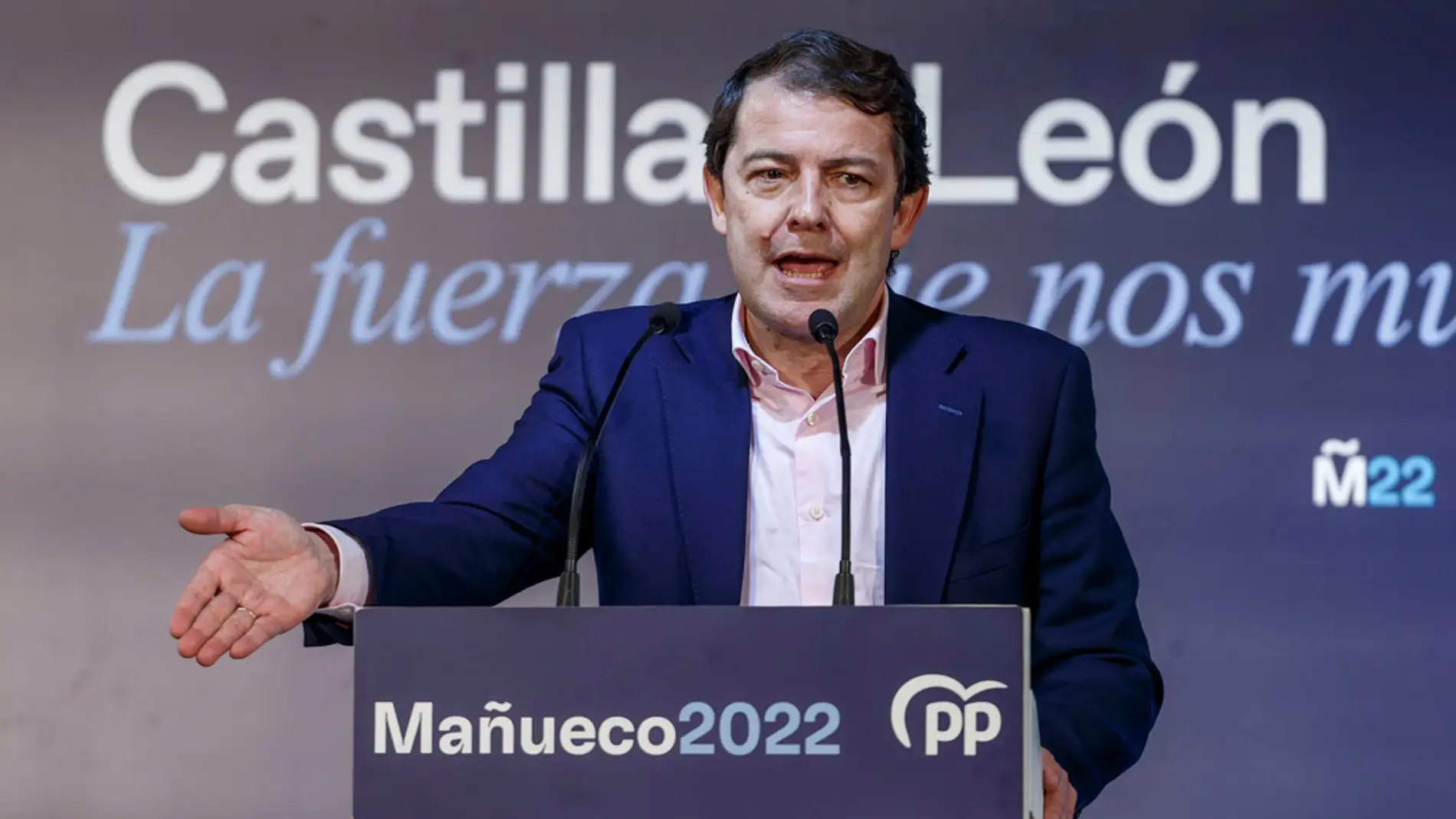
The Partido Popular's (People's Party) candidate and Acting President of Castilla y León, Alfonso Pérez Mañueco, oin a rally the past weekendWhat will happen next Sunday is still unknown, but what many predict is that it will be tight for the Partido Popular, fighting for a majority that seems to be more far as the campaign advances and non having to ratify a deal with the far-right party, VOX, which seems to be growing. Meanwhile, in the sunny south of the country, the President of Andalucía, Juanma Moreno (Partido Popular) looks carefully to whatever the outcome of the call to the polls is, debating himself between calling for a regional election if the result is extraordinary or either hold them and wait until the summer or autumn. It seems like the start of a novel, doesn't it? For those believing it is one, I am pretty sorry, this is what is going on in Spain right now.
After the regional elections in Madrid, where Isabel Díaz Ayuso (Partido Popular) got 64 seats (5 short of a majority) and could make her dream of just the Spanish President's party governing Madrid; and in Escocia, where the nationalists of the Scottish National Party just missed one seat for the wished majority, the Partido Popular-Ciudadanos crisis just gets worse, with our autonomous community as the stage for a new battle for the control of the right-wing. The strategy seems not to be controlled by Jesús Aguilar, whose power inside the Partido Popular would be questioned by a somewhat more conservative faction led by Pablo Casado, who is a member of Aguilar's Executive Committee. After the attempt of a no-confidence motion in Murcia by Ciudadanos, which forced Ayuso and Aguilar to push forward an election in Madrid; Mañueco, without any apparent reason but excusing himself on a "possible Murcia's strategy between PSOE and Ciudadanos", summoned an election for the very same Sunday that, one year ago, saw another call to the polls, that time in Catalonia.
However, the polls seem to be getting worse for Mañueco and Aguilar: when the election was called, the Partido Popular was given a majority by most of them; today they would need to sign an agreement with either VOX or the localist / regionalist parties all around Castilla y León, running for the election to make their voice heard. These parties, which group theirselves in the "España Vaciada" platform (a social movement to ask for measures to protect the rural way of life, with parties such as Soria ¡YA! or Vía Burgalesa) or independently (such as Unión del Pueblo Leonés, a Leonese autonomist plaform; XÁvila, a party made of former PP members which believe on Ávila's regionalism or Zamora Decide, a regionalist party from the province of Zamora).
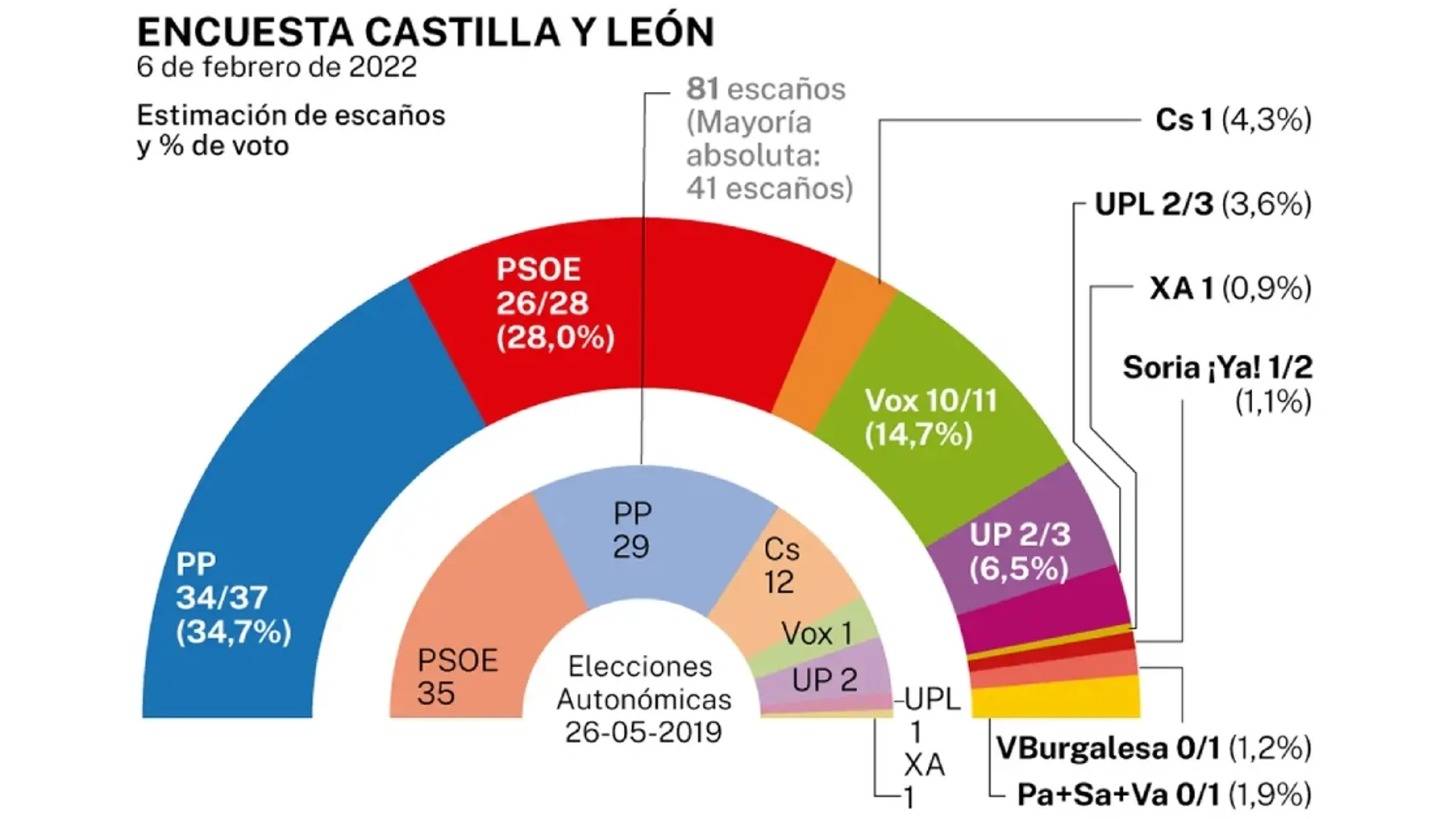
One of the last polls released for the Castilla y León electionWith VOX growing faster and faster, Ciudadanos close to disappearing from another regional parliament and many regionalist parties arising with enough political force, the Government's pillars start to shake like if an earthquake was hitting them hard. Ciudadanos' candidate in the region, Francisco Igea, has stated that "he will not sign an agreement with Mañueco, who backstabbed me and is the one lying to the people of Castilla y León", while today, Isabel Díaz Ayuso, who seems to have been urgently deployed to rescue the bad result the Partido Popular could get, has opened the door to an agreement with VOX. Whatever happens on February 13th, it will have consequences for every single contendents, and who knows if it will have consequences for Jesús Aguilar as well.
OCC: This is a Roleplay-based article, not one pretending to report what is going on in Castilla y León. This article does not intend to break the LOREG law of Spain, which has forbidden the publication of polls for this election since yesterday.
-

SPAIN AND KAITSJA SIGN A DEAL 2 MONTHS AFTER THEIR SUMMIT
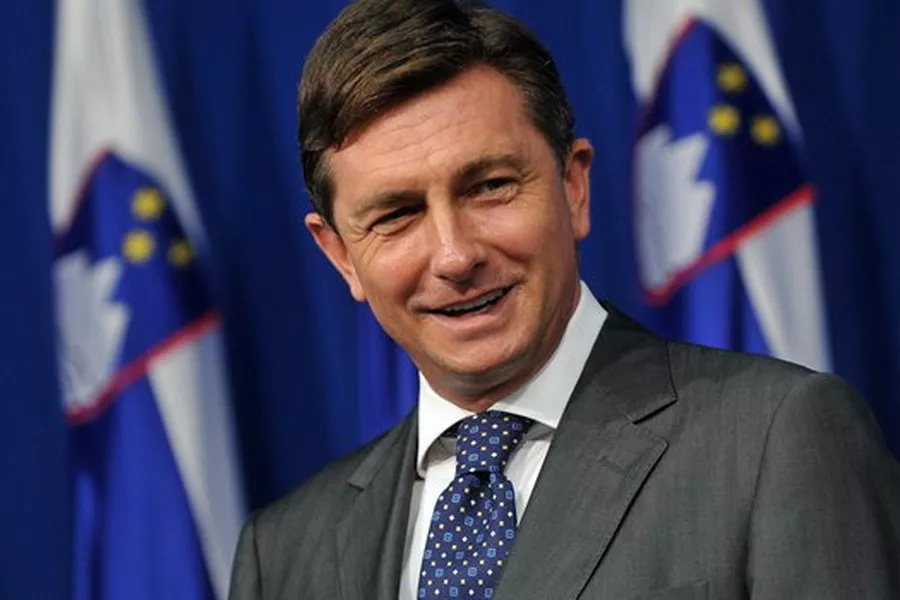
Borut Kallaste, President of Kaitsja, during the Spanish-Kaitsjan SummitMonths of negotiation have finally gotten an agreement. The Spanish Government spokesperson, Íñigo Méndez de Vigo, has announced to the press that an agreement has been achieved between both countries last night, after months of negotiations that have been exhaustive but, at the same time, friendly and always willing to go forward rather than backwards. In words of the Minister for Education, Professional Formation and Universities, the agreement is "the most certain proof Spain is a reliable partner to do business and have military alliances with, providing great service and a fantastic products' quality".
The agreement, which bases were designed between the Spanish President, Jesús Aguilar and the Kaitsjan President, Borut Kallaste; includes several articles on free movement, free trade, scholar programmes and military aspects. Since today, every Kaitsjan that wished to come to Spain will do it freely, without the need of asking for a visa on their arrival to the country. Regulations also change for businesses, with the Kingdom opening to Kaitsjan enterprises and vice versa, allowing enterprises to have an easier establishment and commerce all around Spain. When it comes to schools, interchange programmes will start the next school year, allowing secondary and higher level students to go to Kaitsja for a year and learn more about the Nordic country's culture and traditions.
When it comes to the military side, the Kingdom of Spain has got a foreign base, where it will move all troops and equipment deployed in Mennrimiak after the North American nation decided to cancel the Treaty both countries signed last year. Asked by this, Minister de Vigo has said the relationship with Mennrimiak "stays stable and correct", while confirming the Spanish Government "supposed from the beginning of 2022 that the base wouldn't be operational for them for much longer". Kaitsja, which now becomes the centre of the Spanish Arctic Operations, has agreed to have the Spanish base on the Arctic Ocean and to allow the Spanish navy into the canal, which connects the north and the south of the country, for a 5 million Euros fee for this year. The fee, which will be revised soon, will be payed by the Spain yearly and, if risen for 2023, Spain will pay the difference.
-

INDITEX ANNOUNCES DEPARTURE FROM DUCHIES AMID "CRAZY REGULATIONS" AND CALLS GOVERNMENT TO IMPOSE SEVERE TAXES ON DUCHIAN ENTERPRISES
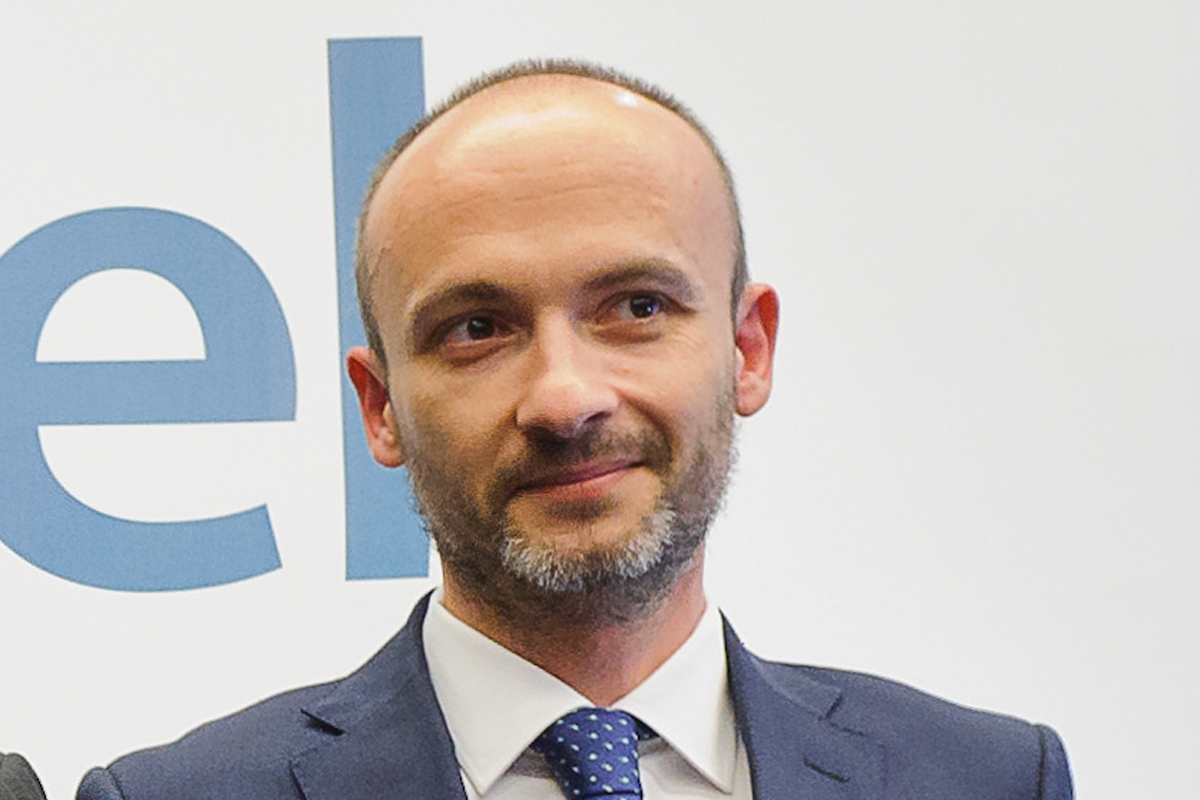
Inditex CEO, Óscar García Maceiras, on a stock photographThe biggest clothing enterprise of Spain, Inditex, which owns brands like Stradivarius, Zara or Pull & Bear has announced its immediate departure from the United Duchies, amid the "crazy and nonsensical regulations" lawmakers of the transmaritime country have passed during this week. In a statement which included the signature of the company's CEO, Óscar García Maceiras, the regionwide known company argues that the main goals of the Duchian trade policy are imposing "unreachable regulations" to indirectly force the creation of Duchian-owned enterprises's monopolies and eradicate any form of competence.
The company, which hardly gets into public calls to Spanish lawmakers, has stated that the Spanish Government should "consider imposing severe taxes on Duchian products and restrictive expansion policies towards companies from this country", as well as take this matter to the European Council, where a bill which was considered to attempt the closure of the Duchian Councillor's business, failed after its withdrawal. Sources from the Ministry of Economy and Competitiveness do not discard this possibility, arguing that "the United Duchies is slowly turning to a low-key Strathae where extreme ambientalist policies are taking over". At the same time, the same Ministry sources say this will "likely condition the discussions about a free trade treaty between both countries".
Looking to the press' headlines, one could guess that the Spanish-Duchian relationship is not the best after the departure from the members of the New Telum Treaty and the creation of ECON, but the departure of INDITEX and the recent calls from the President of Duchies Rail to build a link under the Adventuranza Strait seems to have worsened it, even though the Ducain Military project and other cooperation affairs keep going on normally, and the Spanish Government gives no sign of a bad relationship.
In addition, ADIF's (the Spanish railway infrastructure manager) President, María Luisa Domínguez González, discarded any links between Spain and Northern Africa at the moment: "Spain will not build a tunnel to connect itself with those who question its national integrity, but also due to the huge costs and challeneges the construction would have to face, including the depth of the tunnel and the longitute, which would be around 120 kilometres. The idea has been made without any knowledge of the area, and the same happens with the Strait of Gibraltar: Spain will not build any tunnels under its waters".
-

BREAKING - SPAIN ENFORCES A NO FLY ZONE OVER THE VATICAN AND ITS SURROUNDINGS AFTER ATTACKS

A Spanish Eurofighter jet, in a stock pictureThe Ministry of Defence of the Kingdom of Spain has recently announced the enforcement of a No Fly Zone over this area of the Vatican and its surroundings, after the attacks the Church HQ has suffered from fifty retrofitted regional commercial airliners, possibly led by self-proclaimed Pope Tabitha, sources from the Ministry of Defence say. After hearing the news, Pedro Baños has summoned Miguel Villaroya for a meeting in the Ministry building, where the first news and reports are coming out as this article is written.
10 Eurofighters Typhoon will ensure the No-Fly-Zone is enforced and accomplished by foreign powers, commercial or private airplanes that will to enter the protected airspace. Meanwhile, there are reports which inform of the departure of 7 Panavia Tornado jets, which might have been assigned a recognisement mission to detect the insurgents positions. This information is yet to be further developed.
-

MINISTER EGEA MEETS ASMSA DIRECTOR ARCADI ESPAÑA IN VALENCIA
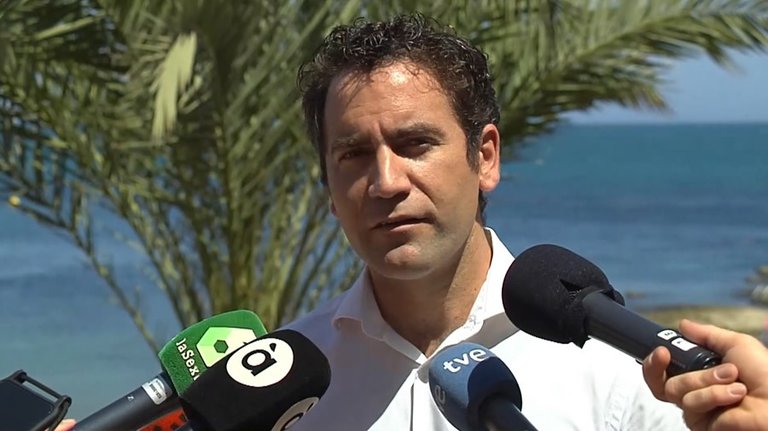
Egea, on a press briefing next to the Playa de la Malvarrosa in Valencia, after his meeting with Arcadi España"Yosai has chosen, once again, the path of misleading statements and door closing". That words have been the conclusion of the Minister for Overseas Territories and Straits, Teodoro García Egea, who has had a meeting with the Adventuranza Strait Maritime Security Agency Director, the Councillor of Territorial Policy, Public Works and Mobility, Arcadi España. The meeting, which according to the Spanish Minister has been "productive and intense", had several aims like defining a clear foreign policy of the Spanish Government concerning the Straits, after the advice of the ASMSA, an agency the Spanish Government has no influence in or power over.
España has then given a press conference in the building dedicated to his department, affirming "Spain will not blockade any nations in the Strait of Adventuranza and that foreign trade and entrepreneurs do have his and the Government's word on that". He has also supported the continued dialogue the members of the ASMSA have been keeping since the start of this new tensions, and thanked "every Councillor and every autonomy that keeps working for the ASMSA". About the Waters Act, the director has thanked the Government for "staying still against bribes and international pressure", and has called for the European Commission to "set up a conference where all countries can give their views and sign an agreement if they wish to".
On the other hand, Egea has then visited the Port of Valencia, where some of the patrol boats of the Adventuranza Strait Maritime Security Agency are located, and the Playa de la Malvarrosa, where he has given a press briefing, firstly answering the statement from the European Commissioner for Internal Affairs and then, the recent statement from the President of Yosai: "To Ms. Kalessed, I would like to ask her if she really heard the President's speech: Spain is not asking for the Commission to bend a debate, it is asking for a convention in which all nations can give their views and defend that this Union shouldn't work by impositions but rather by agreements. We do not want them to take a position, we do not want them to cancel a debate; we want them to act and save the European Union."
The Spanish Minister has also decided to take the Government's spokesperson role to answer the statement the President of Yosai has recently released: "Yosai has chosen, once again, the path of misleading statements and door closing to any proposal that is not theirs. However, has he heard properly the President's speech? While the President said what the Empire had done and mentioned historical events, he turned it around and said all of this is due to a imperialistic dream, a lie. Spain does not seek to conquer territories, just seeks to defend its national territory, have we launched a military operation to conquer Huriyah? No we have not, and we do not plan to, as we do not play to in this case. Simple as that.
Then Mr. Watanabe asks for equal sharing of the strait and the ability to regulate the waters as each country would like, but that is what we offered! He is asking for what has already been put on the table, which he and his government rejected because they did not want to accept a tax which, he says, is unfair because you cannot expect to charge nations that are geographically dependent on the strait. And again he forgets that Spain does not do that, neither in the Mediterranean, where ships registered in Inquista and Gania are not subject to taxation, nor in Adventuranza, where no nation with a coastline dependent on the strait, such as themselves (relatively), the DU, Inimicus, United Duchies or North Diessen was. The Federal Republic of Yosai does support the charge that their allies in the United Duchies make in their canal. But what kind of sick joke is this? Their allies can, and we can't? That is hypocrisy, and not, as they call it, "an injustice". If they accept payment in the Baltic Canal, they must accept payment in the Straits of Gibraltar and Adventuranza as well.
It can be proved that the President of Yosai has not only not listened well to the speech, he has not even read it. He only mentions the reasons he thinks are convenient to support his arguments, but he forgets the workers, the people of the straits, the maintenance of their local communities or their jobs. His ignorance of the situation is alarming, especially when states that blindly support his position for geostrategic and political reasons buy it without even verifying it. And we insist, we will not accept a bribe from the European Union paid by each and every nation, by each and every one of its citizens, to silence the voice of the Spanish people and put an end, by imposition, to a fair and necessary system of taxation. Why should a Nofoagan pay us for scrapping our taxing syng m? It should be companies who pay us for using our Straits, for polluting them and hurting our people's quality of life.
Finally, he ends his speech by taking out of context, always in a very convenient way to reinforce his image, the words of the Prime Minister and accusing Spain, falsely and lying through his teeth as if there was no limit. To begin with, having a coastline on a strait does not give any nation a natural right to possess territorial waters, one claims what one can defend and cooperates with the neighbour that made the claim before and is capable of maintaining it so that no incidents occur, something that we already announced would not happen and that civil and cargo traffic would not be affected.
Secondly, the strait tax is not an imposition, it is a joint agreement, as it is, in the event that they accept the agreement, that we give up our entire claim to divide the strait into two halves. We could do the same, we could turn the tables and say that this is also an imposition. But it ceases to be an imposition when both nations are in favour of it and support it. What is an imposition, however, is what the European Council is trying to do, which wants us all to comply with regulations on such a critical issue as this in the face of disagreement from many nations that help the EU to stand on its own feet. And if in order to avoid imposition we have to suspend our European membership temporarily; if other ways, always within the law, are exhausted or non-existent to avoid it, we will not hesitate to do so.
The Spanish Government wants to reaffirm three things: its commitment to peace and diplomacy; its willingness to negotiate; and that no nation outside this conflict, whatever its position is, and as I was told yesterday by the ASMSA and the GSSA, will be affected by restrictions or tax increases. Furthermore, both agencies are open to dialogue with countries, always through the Spanish Ministry of Foreign Affairs, in order to obtain discounts. And I hope that this conflict ends soon, in an agreed way, and that Spain and the Union can turn the page once and for all. On the Spanish side, I assure you that this is our will, and that we will work for it.
Thank you very much."
-

SPANISH GOVERNMENT APPROVES NEW FLAG AND COAT OF ARMS FOR ANTARCTIC BASES

The new Spanish Antarctic Bases Flag and Coat of ArmsThe Minister for the Spanish Commonwealth, of Overseas Missions and Straits and the Minister of Science, Innovation, Research, Digital Transformation and 2030 Agenda have presented today in a joint press conference after the weekly Cabinet's briefing alongside the Government's spokesperson, Íñigo Méndez de Vigo, the new Spanish Artarctic Bases flag and Coat of Arms. The new regional symbols, designed by an artist from Grequia with suggestions from the scientists established in those bases, are intended to give a revamp to the former ones, which were, according to many, "ugly and non-representative of neither Antarctica nor the Kingdom of Spain".
According to the Minister for the Spanish Commonwealth, of Overseas Missions and Straits, Teodoro García Egea; these new symbols represent the Antarctic continent and its relationship with Spain: for the flag, the colours of the Spanish national flag form a Nordic cross, with the background coloured in dark blue, which represents "the open seas that surround the icy continent". The coat of arms has the Naval Crown of Spain, accompanied by an anchor, a huge iceberg where a penguin waves at the lion carrying the Spanish flag and 2 snowflakes, aiming to represent "the respect for the Antarctic continent Spain has and will keep having".
The Minister of Science, Innovation, Research, Digital Transformation and 2030 Agenda, Víctor Calvo Sotelo; has also given some data about the Hespérides mission and the Permanent Antarctic campaign Spain has recently established: "thanks to the effort our scientists and soldiers, who are helping them to get samples and identify the several penguin species, are making, the Kingdom of Spain has been able to understand Antarctica better than ever before. We will continue our mission as planned and keep collecting data that helps us monitor important events like the impact of Climate Change on Antarctica, and keep reporting them to our partners and allies, as we are the only country investigating over the Antarctic surface".
-

SPANISH GDP GOES OVER 4 TRILLION EUROS BARRIER
Pascal Donohoe, the Government's main economical advisor, this morning in a press conferenceThe Spanish Gross Domestic Product (GDP) has gone over the four trillion euros barrier today, according to the daily data provided by the European Central Bank and the Bank of Spain. The current value is at 4,012,032,411,692.31€; the highest value it has ever been at. After the milestone accomplished has been announced by the Bank of Spain, the Spanish Government main economical advisor, Pascal Donohoe, has summoned the press in the Ministry of Economy's building to celebrate this achievement.
"Spain continues to grow, continues to be an economic superpower and despite the many foreing attempts from some European nations to sabotage us and make us look bad, we will continue our economical growth and keep our fiscal policies". Asked about what the next economical aim of the Spanish Government is, Pascal Donohoe has set two new goals for 2022: "First of all is closing the gap we currently have with Vayinaod and try to equalize their GDP by the end of the summer while opening a higher gap with the smaller economies behind; and second of all on the list is keep the smooth growing rythm and reaching a GDP value of 5 trillion Euros by the end of this year. They are ambitious goals, some could they are unrealistic but these goals are setted because we believe that they can be reached; if we did not believe on them, we would not set them".
Jesús Aguilar, who has also expressed his happiness after the great news coming from the European Central Bank and the Bank of Spain, has responded criticism over his large international agenda and his Government's economical policy: "Foreign policy is pretty complex to understand for many, and I understand that some of the opposition parties might be nervous or just lacking of knowledge about how important it is for Spain to settle down its most prioritary foreign relationships. 2022 had to be the year in which Spain had to go a step further, and we are under way. About the economical policies my Government applies, I think there is not much to say and that the data speaks for myself and my Government"
-

ENAIRE ANNOUNCES "AIR TRAFFIC RESTRICTION" OVER GIBRALTAR AND THE STRAIT

An EasyJet plane, departing from Gibraltar AirportThe Spanish air navigation manager ENAIRE has released a NOTAM (Notice to Airmen) for the area of the Autonomous City of Gibraltar and the homonimous strait, that forbids air traffic to fly over the area at whatever altitude and impedes operations in the Airport of Gibraltar, unless authorised by them. This news have been surprising for the First Minister of Gibraltar, Fabián Picardo, who has called ENAIRE's chief to get to know more about it and has received the guarantee that flights between Madrid, Antequera as well as other destinations will be operated normally and will not suffer any delay or cancellation at the moment.
Albert Issola, the Gibraltar Strait Security Agency director, has also been asked by the news coming from ENAIRE, as he also occupies the Councillor for Transport position in the city's government. He has stated he "trusts the First Minister would get into it and get his questions answered" while, at the same time, assuring that "naval traffic on the Strait and taxation would continue as normal, as well as the presence of the Spanish Armada, as it has been for years all around the Strait and the GSSA boats, since its creation. Nobody has anything to fear", he has concluded.
-

THE MINISTRY FOR INDUSTRY AND COMMERCE WARNS ABOUT "CRITICAL ECONOMIC SITUATION FOR BUSINESSES" IN UD

Román Escolano, Minister of Industry and Commerce of SpainThe Ministry of Industry and Commerce of the Kingdom of Spain has warned consumers and enterprises about the "massive inflationist path" the United Duchies has taken in the last weeks, which could lead to a huge rise of prices and an economical disaster for lower and medium classes. Accoridng to the last reports from the Duchian Government, crops' prices have risen up to a 15% compared to their value in 2021, and the rise could even reach a 60% figure, which would cause a huge devaluation of the Duchian economy and the companies operating on the country.
The Ministry, nonetheless, has made clear the Spanish economy will not be affected by such price rise, as the Spanish Government had other alternatives for the supplies it majoritarily buys from the United Duchies, such as Magnesium and Chromium, which could be now majoritarily imported from Istkalen and the Apostolic Kingdom of Angleter. Many Spanish enterprises have already started to turn to these countries in order to keep their materials coming on time and their prices at their current value. The Spanish Government has also approved to create a new "national strategic reserve" for these two natural resources, with the same expectations as the one previously announced for other minerals.
Reactions have not taken a long time to arrive. Inditex, the famous clothes distributor, considers their decision to leave the United Duchies temporarily was made "on the right time" and that "they were right". Its CEO, Óscar García Maceiras, has said that "the United Duchies recently turned into a kind of an economic hell for anyone wanting to do business, which allows the market to become unstable and be ran by several cartels that will blacklist you if your company does not do what they say. Many Spanish and foreign enterprises are still on time to temporarily suspend operations, and come to Spain if they wish to, where they will surely find less trade barriers or difficulties and more people willing to buy their products and a market they will be pretty happy with."
One of the Spanish companies operating in Duchian soil, Air Europa, has released a statement in which they affirm the company is "following the situation closely and that it will temporarily suspend operations if the economical situation becomes worse than it is at the moment", as well as criticising the local authorities for letting "minoritary cartels ruin the businesses and savings of millions of Duchians".
-

SPANISH GOVERNMENT BANS CITIZENS TRAVEL TO STRATHAE

A flight departing from Madrid to Strathae's capital cityThe Ministry for Foreign Affairs, European Union and Cooperation has announced a ban of all kind of travel to the Republic of Strathae for Spanish citizens, which will start applying from tomorrow, when the clock hits twelve o'clock. The ban comes after the many "attempts of forgiveness" from the Strathaean society, such as singing in public asking for such thing or hugging people (many times against their will, which ended up in fines or arrests in some small villages in Castilla y León) to make them forget about what the central European nation has done to Catholics.
While Strathaean citizens will still be able to come to Spain and explore our country, Spanish citizens will not be able to return the favour (if someone would have ever wanted to do it) and travel to Strathae. According to the Secretary of State for the European Union, the decision has been taken in order to protect "the Spanish citizens integrity and security when travelling abroad", as Strathae poses "severe danger to any traveller wishing to have fun or to know a new country". This kind of decision is taken after the Kingdom of Mennrimiak, who was the first to follow this path but in a more extreme way, banning Strathaean citizens from entering the country and even suspending flight connections with Strathae.
Some citizens have showed their disagreement with the new ruling, despite a huge majority supporting it. One of these citizens against, Sebastián Suárez, told us he had planned a 7-day-long trip to Strathae and now he fears to have lost his savings: "it is unfair for the people that love Strathae, their culture, their ways of acting. I was hugged by them, I have learnt to forgive them, why can't the EU politicians do the same? They are people after all, like you and me man. They deserve to be treated correctly." However, Suárez's opinion seems not to be shared by many people around Spain, neither around Europe.
-


The new Spanish Global Commanders, under the lead of the JEMAD Miguel VillaroyaThe Defence Minister of the Kingdom of Spain, Pedro Baños, has revealed today the names of the newly created Spanish Global Commanders, which will operate from several countries where the Kingdom of Spain has bases at and will monitor the situation in the areas of action, which remain secret as of today. Baños has announced that the Spanish Foreign Base programme has now reached its main goals and it now enters a new phase, which consists of monitoring their assigned areas situation and protecting global peace and the security of states where Spain has defensive missions at, as well as their surroundings.
Some names on the list are not surprising at all: Carlos Brown, who will keep his duties as chief of the Spanish Army in Nofoaga, will also assume the functions as the Commander for the Caribbean, its surroundings and the Pacific Ocean; Daniel Hokanson, who until the closure of the base in Mennrimiak was in charge of the army deployment in the Nordic country and that now was in charge of the deployment in the Spanish Army base in Montenbourg, will also assume the duties of the Arctic command.
Nonetheless, new and surprising names have also appeared on the list, such as Laura Potter, who will take over the Mediterranean, Surroundings and Antarctic Commmand as well as the Government duties of the Research Bases in Antarctica, and that will be the link between the rest of Commanders and the Spanish JEMAD, Miguel Villaroya, who has been assigned the "Rest of the World command". Mr. Villaroya, who has shown up in the press conference along with Minister Baños, has said his colleagues and himself are "excited" for the new mission they have been given and that this operative commands will be key for the future of the Spanish Army and the compromises it has assumed.
-
This post is deleted! -

OPINION PIECE - A CHANGE IN HOW WE LOOK AT THE WORLD

Foreign Affairs, European Union and Cooperation Minister, Alfonso DastisHow do we want the world to be? How are we supposed to look at it? Those two questions, mostly asked in Secondary School's graduation parties when the most talkative classmate gets the main role for some minutes and tries to inspire his classmates, are the ones that have recently overflown the minds of the most veteran advisors of the Ministry of Foreign Affairs. The main goal of asking this? Trying to find a new way to make the Spanish response experienced, logical and reasonable. The old days of "overreaction", like when Reitzmag kidnapped Bernie Sanders and Spain copied Gallorum's sanctions, even extending them; are now over, according to these veteran advisors.
The dilemma has been presented to the Spanish President, Jesús Aguilar, who is also one of the foreign policy architects. Under the title of "Establishing a new path for our Foreign views", a 200-page-long document contains the new principles of the Spanish foreign policy. We can confirm two things about it: we have been able to see a sneak preview and no, Alfonso Dastis is not going to be dismissed as Minister, but rather seeing his powers increased and getting to speak more than he actually did. What is the sense of having a foreign affairs Minister when you do not listen to him as much as you should? Jesús Aguilar, who seems like he is a well-mantained machine, starts to show the weaknesses of a politician that has been in power for 6 years.
Under the new strategical views of the Spanish Government, several key topics can be found: the Treaty of Telum, the Spanish closest allies, neighbours, military strategies (with the recently revealed commands being a hint of what could come afterwards), international response and balancing power. When asked, Spanish advisors are able to recognise who the essential allies are, and which challenges we will have to face in the short / mid-term: "We are aware of them, and our response is ready. We have gained experience from the last avoidable situations, and the mistakes we have done before will not be repeated. Spain needs to go back to be that machine which never stops, never rests and keeps working for peace and security in the European Union".
How everything will turn out is still a mystery, little do we know about what Alfonso Dastis and Jesús Aguilar have prepared for us and the rest of Europe. However, asked in a party rally, the "Papacito" has settled some red lines: "the new design of our foreign policy will stay the same when it comes to the Strait of Gibraltar and so will our close partnership with our allies in Telum Treaty". What the future holds on the areas is, nevertheless, yet to unfold.
-

SPAIN BECOMES 7TH EUROPEAN ECONOMY
:format(jpg)/f.elconfidencial.com%2Foriginal%2F43e%2Fce1%2Fe23%2F43ece1e23e7d4bf8c5b0a9f9bf412e8a.jpg)
Madrid Stock Market and the IBEX35 are coloured in green after the announcement from the Government"Someone should give Pascal Donohoe a reward for the great work he is doing since he got into the Government", someone said this morning while I took the Metro to the office where I am writing this article. Said citizen is not wrong: it only took 40 days to the Spanish economy to reach and overtake Vayinaod, a milestone that was planned to be reached by the end of the summer, that has not even started yet despite the high temperatures (around 30º in many parts of the country) and the bad weather being gone for weeks now.
Luis de Guindos, Minister of Economy, Commerce and Competitivity, has claimed this data "not only confirms the good work the Government is doing when it comes to economics", but also "the huge knowledge Pascal Donohoe has and how his shadow management of our economy is making us grow faster, and better". The Minister's words have, however, not received the same reactions depending of the ideological spectre of the spokesperson of the party you asked: while Ciudadanos and Navarra Suma have applauded it, the Partido Socialista has claimed the Government is "more worried about the economy rather than employment or the needs of the most needy families". Podemos has gone one step further, claiming the reported data "is fake and made up" and calling for "massive demostrations against this Government and their corrupt past, present and future".
De Guindos, who was also involved in the making of the Treaty of Finisterre, which led to the creation of the Emuzone, has also announced a huge tax drop that will be put in place in the coming weeks, as soon as the Congress and the Senate pass it; and he has made a proposal to the Top 8 European economies (Inquista, Duxburian Union, United Duchies, Inimicus, Fremet, Vayinaod, United Kingdom and Spain itself), calling for the creation of a restricted entry group formed uniquely by them to discuss several worldwide economic challenges.
-

MADRID TO HOST THE FIRST TELUM TREATY SUMMIT

Madrid Summit logotype, unveiled today by the Ministry of DefenceTelum Treaty has finally decided to have their first ever summit, and it will be in Madrid, according to the Spanish Minister of Defence, Pedro Baños. Mr. Baños has made this announcement alongside Alfonso Dastis, the Foreign Affairs, European Union and Cooperation Minister; this morning in the Congress, after receiving confirmation from the invited countries, which are the members of the alliance, about the availability of the proposed dates, that have now become the official ones.
Both Ministers have confirmed the attendance of the Head of Government or State of the member nations, meaning that President Jesús Aguilar will welcome Archbishop Mikaela Kligenberg, Emperor Artabanos, Steward Dante Maximillian and Confederal President Nestor Karaman, whose first act will be this important summit for the alliance. In words of Minister Dastis, Spain "feels honoured to receive the visit of such important leaders and close friends of the Spanish Government and the people of Spain". Asked about the possible anti-Telum reactions and demostrations, majoritarily led by Unidas Podemos, nationalist and pro-independence political groups, the Minister has guaranteed the security of the attendants as well as freedom of speech to those against the summit. However, he has not doubted to criticise these as "pointless".
President Aguilar has reacted via Twitter, congratulating both Ministers for their hard work towards achieving this historical event, as well as expressing his personal wish of welcoming "his close friends" from Inquista, the Duxburian Union, Inimicus and North Diessen as soon as possible to the capital city. The venue where the summit will be held is IFEMA, which also hosts important events such as FITUR throughout the year. The Head of Government has also reacted positively to the announced proposal of the creation of a Group of 8 Top European Economies, saying it would "open a new chapter in international relationships" and the permanent member status of its members would "add stability to it, and avoid tensions or any bad gesture during its meetings".
-

MADRID ARMOURS ITSELF FOR TELUM TREATY SUMMIT
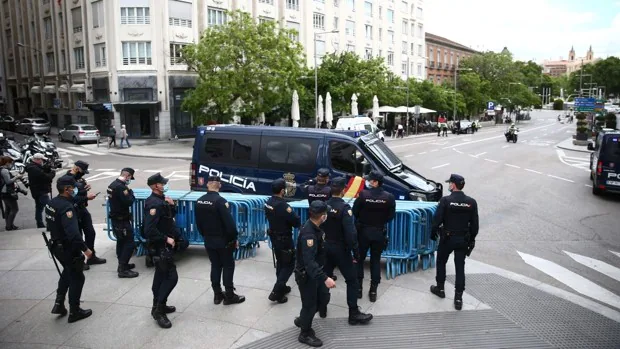
The event will take place on 29 and 30 June and will cause traffic disruptions and many inconveniences for security reasons.The first ever Telum Treaty summit will be held in Madrid in the last week of June and will completely disrupt the life of the Spanish capital, causing a great deal of inconvenience to citizens. For several days there will be many traffic cuts and exclusive routes and lanes will be set up for the transfer of diplomatic delegations. Security will be another of the challenges of the meeting, as 4 international leaders will be coming to the capital and will be staying in the city's most luxurious hotels, which will be fully armoured for the duration of the event. The attendants, Emperor Artabanos from Inimicus, Archbishop Mikaela Kligenberg of Inquista, Confederal President Nestor Karaman from North Diessen and Steward Dante Maximillian of the Duxburian Union; will arrive the very same date of the start of the summit, leaving the day after.
In addition, air security plans are being designed, as well as cybersecurity plans for possible digital and computer attacks by hackers and special devices to deal with the call for mass protests by groups and organisations. The Home Affairs Minister is expected to transfer some 12,000 national police officers to Madrid, who will join another 12,000 officers from the capital, meaning that 25,000 police officers will be deployed in the city to protect the Telum Treaty summit, without counting the Madrid Municipal Police officers. In addition, the Madrid City Council will mobilise more than 1,000 Municipal Police and Mobility Police officers to facilitate the movement of attendees and diplomatic caravans.
The Ministry Home Affairs has already held the first meetings with the National Police and Civil Guard to design the security plans, having already begun to design the most important details and details. The meetings will be held in halls 9 and 10 of IFEMA and hall 1 will house the CECOR (Security and Emergency Coordination Centre), according to initial estimates. In addition, a gala dinner is scheduled to be held at the Prado Museum and another reception at the Royal Palace in Madrid. Other cultural meetings and visits to the city are also planned, although these have yet to be defined.
Most importantly, there will be exclusive itineraries for the transfer of delegations. This will mean that there will be times when traffic will be completely cut off between the centre of Madrid and IFEMA so that the delegations can circulate without stopping to the fairgrounds and vice versa. Officials expect each diplomatic caravan to spend less than 10 minutes travelling from the hotels in the centre to the Campo de las Naciones, where the Summit will take place. The intermittent interruptions will affect the Paseo de la Castellana, Paseo de Recoletos, Gran Vía, Avenida de América, Glorieta de Ruiz Jiménez and Bilbao, Plaza de Colón, Goya, carretera de Barcelona and M-11. Sources from the organisers assure that the traffic cuts will last no more than an hour and will take place between 09.00 and 10.00 and between 17.00 and 18.00 hours. In addition, all building work in the city will be halted during these days, and some of the areas where the processions will pass through will be cleaned and tidied up.
It is also not ruled out that the Metro will be cut on line 8 at IFEMA (currently without service until May due to building work) and it is even possible that companies based near the fairgrounds will be advised to close for two days for security reasons. The Juan Carlos I park and the surrounding area will also be closed. The Concejalía de Seguridad Ciudadana y Tráfico will also have more than 50 tow trucks available to check the streets through which the parades will pass. "Any car that obstructs the path of the visitors will be removed," said municipal sources. There will also be 100 patrol cars and 500 motorised agents on the streets of the city.
-

AGUILAR REFORMS THE ELECTORAL LAW ONCE AGAIN
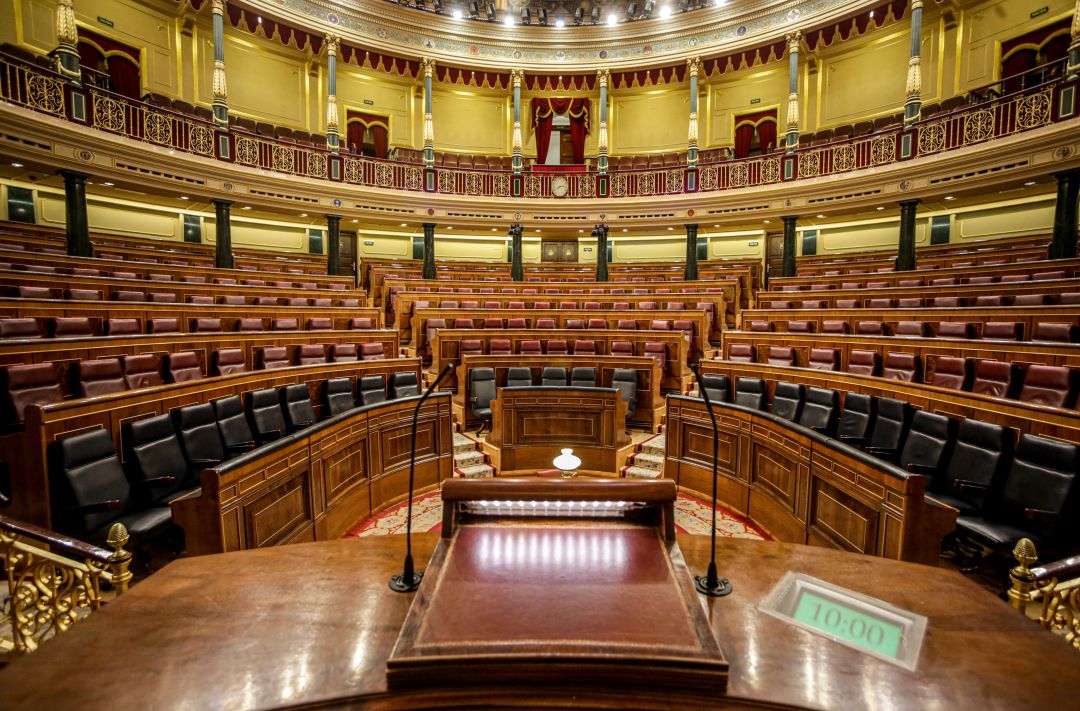
The reform will just apply to the Congreso de los Diputados, which size will be reduced as the current system has been proven innefficientThe Extraordinary Cabinet Meeting (Consejo de Ministros Extraordinario) passed yesterday yet another reform of the Spanish Electoral Law, that will only apply to the Congreso de los Diputados as its size will be ‘significantly reduced’. The Congreso, which used to have 350 members of Parliament, saw its size increased to 768 members after the electoral reform, to increase representativity and political parties within the system, yet the new method has been proven to be innefficient, as debates take longer than expected and the chamber is slower than ever before.
Jesús Aguilar, who is on a roll after his party won the election in Castilla y Leon (even though he has been criticised for authorising the regional President, Alfonso Fernández Mañueco, to sign a Government agreement with the far-right party VOX) and the election in Andalucia, achieving a never-seen-before-absolute majority for the Partido Popular with Juanma Moreno as candidate, wants to take advantage of the great results his party is having and make up a new electoral system that benefits the big parties like the Partido Popular and the Partido LSocialista and damages the representation of smaller ones, like PACMA, Tú Patria or the regionalist parties.
The Minister for Home Affairs, Ana Beltrán, had to undergo the many questions of the journalists about this system, saying that some of the opposition claims that we have compiled on this article are ‘blatantly false’ and that ‘the Government is not reforming the system to gain advantage over its opponents’, but rather to ‘speed up Congress debates’. Ciudadanos, the main ally of the Partido Popular, has warned the Partido Popular that if they call a new general election after the passing of this law, they won't be able to expect another 4-year-long agreement. Will Jesús Aguilar call another General Election and try to gain an absolute majority once again? Only the President himself knows.
-

USING THE SYSTEM TO GAIN AN ADVANTAGE
Opinion piece by Estefanía Molina
Aguilar, in a press conference this morning announcing his call for a general election on July 24thEtta James' ‘At Last’ plays in the background. We are in the Palacio de la Moncloa, more exactly in the Consejo de Ministros building, first floor. It's Thursday, June 16th; and Jesús Aguilar has given the task to his Vicepresident, Soraya Sáenz de Santamaría, of preparing the royal visit to the Empire of Inimicus. His secretary, Carlos, has been ordered not to transfer any call to him for 2 hours. The door is closed, only Aguilar has the key to open it. He is not furious, he is not mad at anyone; he needs silence and to think what is over the table carefully. The balcony is open, even though the heat wave Madrid is undergoing is exhaustive to any human. Not even a single breeze can be felt.
Sounds like a novel, right? Well, it is not. According to sources close to the now Acting President of the Kingdom of Spain, Aguilar had been planning this for a week, and if things in Andalucía went alright, he would give it the green light. The polls are favourable to him, with all of them saying he would regain the absolute majority he lost 2 years ago, reduce Ciudadanos to ashes and ending with all those ridicolous parties that his first reform brought to the Congreso de los Diputados. The plan was perfect, he just needed the ideal excuse to call the election.
Ciudadanos, whose relationship with the Partido Popular has turned for the worse in the last year and a half, fell for the trap Aguilar prepared for them; and was planning a non-confidence motion at the backs of the President, without being aware that several loyal deputees were warning the Spanish President about what they were going to do. They failed in Murcia, in Madrid and now, they failed to kick Aguilar out. Ayuso, the President of the Autonomous Community of Madrid, warned the President that he had to act like if he "didn't know it" and "call the election as soon as the electoral law was passed". He did exactly what she suggested.
Yesterday night, the reform was passed, and Ana Beltre us dismossed the critics that said it was going to be used for meeting the "Partido Popular's electoral interests". This morning, Aguilar summoned the press for a conference, and told us what he had been warned of, before confirming he was indeed calling a general election. He says he is saddened for having to do things this way, but that he cannot risk the will of the Spanish people to be kidnapped by unwanted parties. Ciudadanos called him a "traitor", and the Socialist Party said that "they have told everyone what would happen if the law passed". Will anyone get him out of Moncloa? Only time will tell. But one thing seems clear: Aguilar used the system, and he gained the hugest advantage ever given to a President that calls for an early election.
-

AND HE CAME BACK (SOON)

Jean-Claude Juncker, arriving this morning at EuropolisJean-Claude Juncker will surely have to write another book, but with a different title, after his victory on the European Commission election against the Duchian candidate, Calvin Künhert, that makes him the new Premier Commissioner of the European Union. As a fun fact, he accomplished his first promise just after the results were proclaimed: he came back (soon), which also uses to be the title of his first book. However, what will Mr. Juncker face in his new term serving the Europeans? What challenges are waiting for him?
Firstly, he will have to do a new budget for the European Union, which is expected to raise massively after the European Development Agency gets a bump on its numbers and the European Agricultural Fund is created, something that is expected to happen before taking the EU's budget to the Council for discussion and vote. Juncker will also have to face the reform of the European Court of Justice and the European Council: the first one will be easier than the second, with the latter requiring a previous dialogue with the Council Speaker, Iras Tilkannas. According to Juncker, he wants "to include the Speaker on the reform so the Commission gets a better view on what the Council should become in the future".
With his nickname being "the orchestra conductor", Juncker will now properly do that from the position that is supposed to: the Premier Commissioner seat. A new era begins for Europe, and the old but smart Jean-Claude seems to be ready to deliver lots of changes in just four months. Will he call his second book "delivering"? Time will tell.
-

MINISTERS SWORN-IN: WHAT TO EXPECT FROM THE NEW MINISTERS?
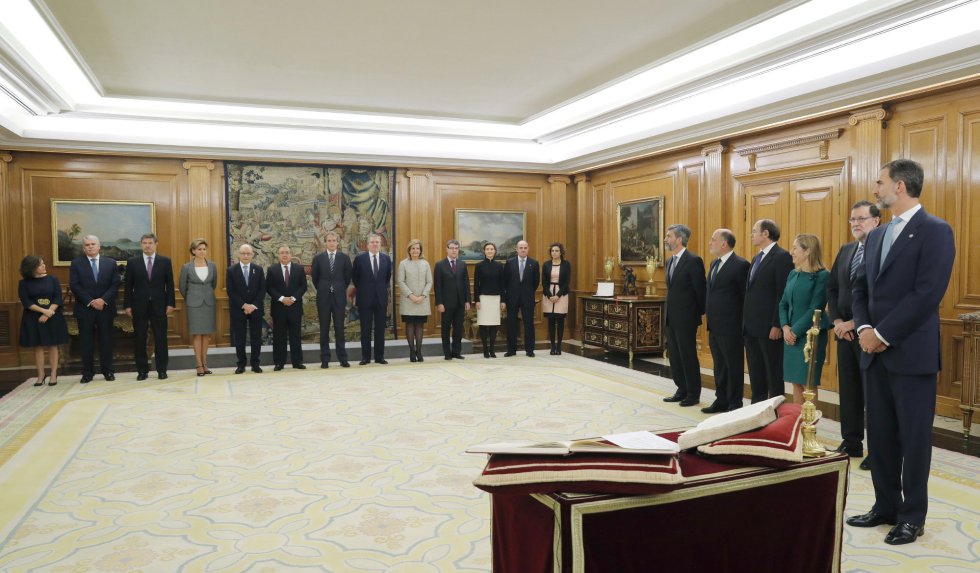
A stock picture of the swear-in ceremonyThe new Aguilar cabinet has sworn-in in front of King Felipe VI today at the Palacio de la Zarzuela, marking the start of the 4th Aguilar cabinet after the Congress approved the inauguration of Jesús Aguilar and the King designated him as candidate for the country's presidency. The Cabinet keeps the number of members (22 ministers and the President of the Government) and the number of women on the cabinet increases to 10, being the cabinet with the higher parity of representation in the Spanish history, and 8 new ministers.
What should we expect from them? According to President Aguilar, these new Ministers have been chosen because of their qualities and devotion to the Ministry they have assumed, and therefore the Spanish citizens "will be their first priority". In the 'relevant' ministries, there have been two important changes: the now former Galician President, Alberto Núñez Feijóo, now becomes Minister for Home Affairs replacing Ana Beltrán; and Pascal Donohoe replaces Luis de Guindos, who Jesús Aguilar intends to fill in as candidate to the ECB's Presidency, in the Ministry of Economy and Competitiveness.
Another big change to the Government composition comes with the division of the Ministry of Science, Innovation, Research, Digital Transformation and 2030 Agenda into two different ministries: Anja Karliczek will assume Science, Innovation and Research while Víctor Calvo-Sotelo assumes Digital Transformation, Cybersecurity and 2030 Agenda. While Calvo-Sotelo is a known face, being directly involved in the Hispano-Inquistan discovery of Atlantis, Anja Karliczek is a direct suggestion from the Germanium President, Erma Arbeit. Aguilar has also included in his cabinet a Grequian and a French Minister, Mariastella Gelmini (Transport, Mobility and Urban Agenda) and Josianne Corneloup (Health, Consumption and Social Welfare).
The biggest change, and probably the most relevant, takes place in the recently renamed Ministry for the Spanish Commonwealth Affairs, Overseas Missions and Territorial Waters, now assumed by the Londoner Elizabeth Truss from Teodoro García Egea. According to sources close to the Spanish President, the election of Truss is not casual: Aguilar thought Egea's public image was way too weared away and that his policies were soft, when this Ministry requires "a hard line with hard, clear policies". Truss will have to deal with the protection of the Strait of Gibraltar and the taxing policy, one of the highest challenges for Spain every year.